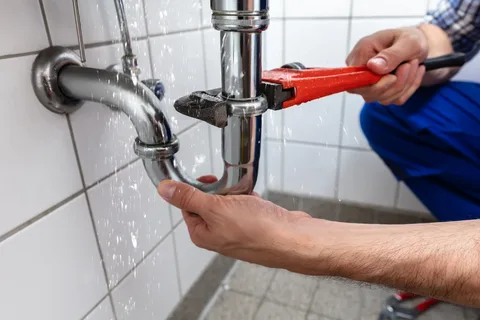When undertaking any home improvement project, especially something as intricate as kitchen plumbing services, unexpected issues can arise. These surprises can be frustrating, time-consuming, and costly if not managed properly. However, with the right approach and preparation, you can navigate these challenges effectively and ensure that your kitchen plumbing project stays on track. In this guide, we’ll explore how to handle unexpected issues during kitchen plumbing services, providing you with practical tips and solutions.
Understanding Common Kitchen Plumbing Issues
Before diving into how to handle unexpected issues, it’s essential to understand what types of problems are common in kitchen plumbing services. Knowing what to expect can help you be better prepared.
Leaking Pipes
Leaking pipes are one of the most common issues encountered during kitchen plumbing services. These leaks can be caused by various factors, including corrosion, improper installation, or damage during renovations.
Clogged Drains
Clogged drains can occur due to the buildup of grease, food particles, or other debris in the pipes. This is a frequent problem that can disrupt your kitchen plumbing services.
Low Water Pressure
Low water pressure can be a frustrating issue, often caused by sediment buildup in the pipes, leaks, or problems with the municipal water supply.
Faulty Fixtures
During kitchen plumbing services, you might encounter faulty fixtures such as leaking faucets or malfunctioning dishwashers. These issues can arise from wear and tear or incorrect installation.
Preparing for the Unexpected
Preparation is key to handling unexpected issues during kitchen plumbing services. By taking the time to prepare before starting the project, you can mitigate many potential problems.
Conduct a Thorough Inspection
Before beginning any work, conduct a thorough inspection of your kitchen plumbing system. This includes checking for leaks, inspecting the condition of pipes and fixtures, and identifying any areas that may need special attention. A professional plumber can assist in this process to ensure nothing is overlooked.
Have a Contingency Budget
Unexpected issues often come with unexpected costs. It’s wise to set aside a contingency budget for your kitchen plumbing services. This budget should be around 10-20% of the total project cost, allowing you to cover any surprises without financial strain.
Gather the Right Tools and Materials
Ensure you have all the necessary tools and materials before starting your kitchen plumbing services. This includes having spare parts, sealants, and tools for addressing leaks or clogs. Being well-equipped will help you respond quickly to any issues that arise.
Addressing Common Plumbing Problems
When unexpected issues arise during kitchen plumbing services, knowing how to address them is crucial. Below, we discuss some common problems and how to handle them effectively.
Fixing Leaking Pipes
Leaking pipes can cause water damage and disrupt your kitchen plumbing services. To fix a leak, first, turn off the water supply to the affected area. Then, use a pipe repair clamp or epoxy putty to temporarily seal the leak. For a more permanent solution, consider replacing the damaged section of the pipe.
Tip: If the leak is extensive or difficult to access, it’s best to call a professional plumber to handle the repair.
Unclogging Drains
Clogged drains are a common issue during kitchen plumbing services. To unclog a drain, start by using a plunger to dislodge the blockage. If this doesn’t work, try a plumbing snake or auger to break up the clog. Avoid using chemical drain cleaners, as they can damage your pipes over time.
Tip: Regularly clean your drains with a mixture of baking soda and vinegar to prevent future clogs.
Restoring Water Pressure
Low water pressure can be caused by various factors. To address this issue, first, check if the problem is localized to one fixture or affects the entire kitchen. If it’s just one fixture, cleaning the aerator may help restore pressure. If the problem is more widespread, consider flushing your pipes to remove sediment buildup or checking for leaks in the plumbing system.
Tip: If low water pressure persists, consult a plumber to diagnose and fix the issue.
Repairing Faulty Fixtures
Faulty fixtures such as leaking faucets or malfunctioning dishwashers can be a nuisance during kitchen plumbing services. For leaking faucets, replacing the washer or O-ring often solves the problem. If a dishwasher isn’t working correctly, check for clogs in the drain hose or issues with the water supply line.
Tip: When replacing fixtures, invest in high-quality products to avoid future problems.
When to Call a Professional
While DIY solutions can be effective for minor issues, there are times when calling a professional plumber is the best course of action during kitchen plumbing services.
Extensive Leaks or Water Damage
If you encounter extensive leaks or water damage, it’s crucial to call a professional immediately. Water damage can lead to mold growth and structural issues if not addressed promptly.
Complex Plumbing Systems
If your kitchen plumbing system is particularly complex, it’s best to leave the work to a professional. This includes homes with older plumbing systems or those with intricate setups involving multiple appliances.
Persistent Problems
If you’ve tried to fix an issue multiple times without success, it’s time to call a professional. Persistent problems may indicate a more serious underlying issue that requires expert attention.
Preventing Future Issues
Preventing future problems is just as important as addressing current ones. Here are some tips to help you avoid unexpected issues in your kitchen plumbing services.
Regular Maintenance
Regular maintenance is key to keeping your kitchen plumbing system in good working order. This includes checking for leaks, cleaning drains, and inspecting fixtures for wear and tear.
Upgrade Outdated Plumbing
If your kitchen has outdated plumbing, consider upgrading it as part of your kitchen plumbing services. Old pipes and fixtures are more prone to problems, and upgrading can save you money in the long run.
Educate Yourself
Educate yourself about your kitchen plumbing system. Knowing how your plumbing works and how to perform basic repairs can help you handle unexpected issues more effectively.
Conclusion
Handling unexpected issues during kitchen plumbing services requires preparation, knowledge, and sometimes the assistance of a professional. By understanding common problems, preparing adequately, and knowing when to call in an expert, you can navigate these challenges successfully. Remember, regular maintenance and upgrades are essential for preventing future issues, ensuring that your kitchen plumbing system remains in optimal condition for years to come.

